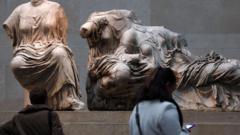*Discussions surrounding the return of the Parthenon Sculptures have intensified, with significant diplomatic conversations occurring between Greece and the UK amid ongoing negotiations.*
**Progress Towards Parthenon Sculptures' Return to Greece, Claims Former Official**

**Progress Towards Parthenon Sculptures' Return to Greece, Claims Former Official**
*Former Greek government adviser highlights negotiations regarding the Elgin Marbles may be advancing, hinting at a potential deal.*
The return of the Parthenon Sculptures to Greece, also known as the Elgin Marbles, appears to be closer than ever, according to insights from a former Greek government official. Professor Irene Stamatoudi, who previously advised on negotiations concerning these ancient artifacts, stated in a recent BBC interview that there has been notable progress in discussions regarding their relocation from the British Museum back to Athens.
During a meeting at Downing Street on Tuesday, UK Labour leader Sir Keir Starmer and his Greek counterpart engaged in conversations, though the return of the sculptures was reportedly not officially on the agenda. However, there are indications from Greek sources that this topic was raised, reflecting a broader diplomatic effort to resolve a contentious issue that has strained relations between the two countries for decades.
The Elgin Marbles, revered as significant representations of Ancient Greek heritage, were taken during the early 19th century by British nobleman Lord Elgin, amidst the tumultuous backdrop of Ottoman rule in Greece. Greece has long insisted the marbles were acquired illegitimately, while the British Museum maintains that they were legally obtained.
Professor Stamatoudi expressed her hope that a definitive deal is within reach, emphasizing the importance of these sculptures to Greek national identity. She revealed that the Greek government has proposed a "cultural, strategic partnership," potentially involving sending other antiquities to the British Museum to occupy the space that would be vacated by the marbles.
The Greek Prime Minister Kyriakos Mitsotakis has prioritized this issue, especially after a diplomatic fallout ensued last year when a planned meeting with then-Prime Minister Rishi Sunak was abruptly canceled following discussions about the marbles. Despite conflicting positions regarding the sculptures’ ownership—where the UK government defers decisions to the independent trustees of the British Museum—new dialogues signal a shift in approach towards a potential resolution.
As negotiations continue, Starmer’s stance appears to be more conciliatory compared to previous government positions, suggesting openness to a relocation if an agreeable deal is reached. Meanwhile, the British Museum remains under a legal framework that complicates the outright return of artworks but is exploring options for special loan arrangements.
With the Elgin Marbles symbolizing a significant cultural narrative for Greece, their potential return not only represents a landmark in historical restitution but also offers an opportunity for renewed UK-Greece relations amid an increasingly interconnected global landscape.
During a meeting at Downing Street on Tuesday, UK Labour leader Sir Keir Starmer and his Greek counterpart engaged in conversations, though the return of the sculptures was reportedly not officially on the agenda. However, there are indications from Greek sources that this topic was raised, reflecting a broader diplomatic effort to resolve a contentious issue that has strained relations between the two countries for decades.
The Elgin Marbles, revered as significant representations of Ancient Greek heritage, were taken during the early 19th century by British nobleman Lord Elgin, amidst the tumultuous backdrop of Ottoman rule in Greece. Greece has long insisted the marbles were acquired illegitimately, while the British Museum maintains that they were legally obtained.
Professor Stamatoudi expressed her hope that a definitive deal is within reach, emphasizing the importance of these sculptures to Greek national identity. She revealed that the Greek government has proposed a "cultural, strategic partnership," potentially involving sending other antiquities to the British Museum to occupy the space that would be vacated by the marbles.
The Greek Prime Minister Kyriakos Mitsotakis has prioritized this issue, especially after a diplomatic fallout ensued last year when a planned meeting with then-Prime Minister Rishi Sunak was abruptly canceled following discussions about the marbles. Despite conflicting positions regarding the sculptures’ ownership—where the UK government defers decisions to the independent trustees of the British Museum—new dialogues signal a shift in approach towards a potential resolution.
As negotiations continue, Starmer’s stance appears to be more conciliatory compared to previous government positions, suggesting openness to a relocation if an agreeable deal is reached. Meanwhile, the British Museum remains under a legal framework that complicates the outright return of artworks but is exploring options for special loan arrangements.
With the Elgin Marbles symbolizing a significant cultural narrative for Greece, their potential return not only represents a landmark in historical restitution but also offers an opportunity for renewed UK-Greece relations amid an increasingly interconnected global landscape.






















